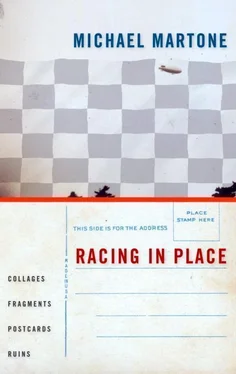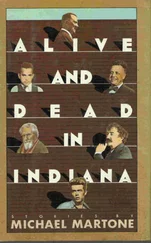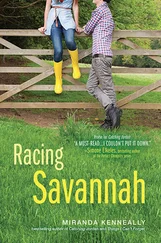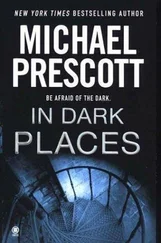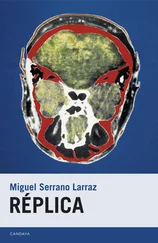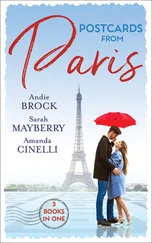Breast
On the first day of classes I always ask my students where they are from. Force of habit and habitat. "Where you from?" There are always the ones, more than you would guess, who answer that they are from nowhere and everywhere, usually self-described brats of the military, the conglomerate, the academy. Once a woman, anticipating the question, I suppose, or homesick, or both, pointed to a spot on her chest. She was wearing a T-shirt printed with a map of her state. She pressed her finger down indicating the region above her heart. "I'm from right here," she said, turning left and right so that the entire class could see.
Battlefield
My frail father sat, a paltry thing, at the card table sorting the puzzle pieces by color. He had defined the boundary of the puzzle, piecing together the edge. Inside the edge, he added to the mounds of separate hues. Each individual piece was nothing but an abstraction, a cloud of color. He tossed a piece into one pile and another piece onto another. He chewed on what looked like a bit of the sky, considering. He read the terrain, the declivities and defiles. He surveyed the shattered landscape before him, nowhere near the moment when the landscape pictured on the box art becomes the tiled landscape on the table.
Basketball
My father played guard. There is a picture in his yearbook. He is posed in that antique stance, the underhanded free throw. It is a composition of curves. His oval face. The arch of his bowed legs. The parabolic cradle of his arms around the ball. The squashed ovoid of the foul circle inscribed at his feet. The 0 his mouth is forming. The eggs of his eyes. The twin black scallops of their irises. And on his jersey, double zero.
Baptism
After the Battle of Tippecanoe, William Henry Harrison became 01' Tippecanoe. The history of a piece of ground is recorded in a deed. Here, the deed was deeded to the man. Of all my addresses, not one has attached itself to me. Nor have I made any place memorable. There are times I want to lose myself in this place or, better yet, confound all that I find while looking. I want to be the fixed point and the vector, the tangent. I want to wrap myself in this field as if it were a robe, rob it of its name, and then roam.
Byzantium
Today Sparta looks so midwestern. Cornfields, fastened all around, surround it. Its streets are arranged in a tidy grid; a green or red tractor putts by. The famous Sparta of antiquity was long ago laid to waste. The present city was built only in the last century along modern functional lines. But up in the hills, in the mountains outside Sparta, above the neat order, I stumbled on what is left of the red brick walls and buildings of a provin cial Byzantine outpost, Mystras. The Ottomans sacked it last, in 1453. It isn't touristed much; the crowds more are attracted to the famous marble sites, the classics. Even in ruin it's a backwater, the B. of the Holy Eastern Roman Empire. The afternoon was hot, and I wandered the dusty streets between the intricate piles of rubble, thinking of drowsy emperors.
The few restored churches came equipped with their own featherbedded guards who, honestly, sang for me when they turned away, magnanimously ignoring my prohibited picture taking of their faded frescoes. A convent stood extant in the heart of town, and through the bars of the gate, I watched one old tattered nun sweep the same stone square of the courtyard for the rest of the afternoon.
Bug
I took a break from tending my father, who was tending his heart, to meander around Indiana searching for B. That neck of the woods, pretty much woodless, beckons. Its expanse invites me, its infinite regression of the horizon, its pulled focus pulling me deeper into depth and distance. I get restless after I travel so far to return home. My parents have come to expect it. Tank up a car. I bug out. I never know what I'll find when I don't even know what I am looking for. There isn't much to find.
Here I was going to try to do something with the seventeenyear cicada hatches. Picture myself driving through the hatch as I did one year a few years ago.
Here, I was going to force a connection with their spent shells scaling the tulip poplars and golden rain trees in New Harmony and me tooling through their sawing music, encased in my own carapace.
A friend writes that this last summer the Midwest was plagued with lady beetles blooming when the aphids they feed on bloomed. When the soybeans were cut and the aphid population crashed, the predators moved indoors. "Still in the corners of most rooms in our house," he writes, "you can see them masquerading as innocent specks, trying to hole up here all winter." Innocent specks. In "Order of Insects," Gass's narrator also contemplates the insects that appear in her home, gradually falling in love with the infestation. There is here in Indiana an abundance of almost nothings, no-see-ems, gnats, and midges. An abundance of almost nothing. This is plane geometry. The infinite number of points in a finite space.
Business
"In the Heart of the Heart of the Country" ends with "Business." It is about Christmas in the town of B. The narrator is alone, outside, downtown, listening to barely audible carols being broadcast to set a festive and, it is hoped, profitable mood. I am not sure anymore of how places inform or deflect us.
I sailed to B. again and drifted down the streets, mildly interested by what was happening in each neat house-what recovery, what quiet desperation, what stories were being recounted, what lives lived. But it is more the wrack and spindrift that draws my attention now. It isn't seas so much I ply but their edges. Indiana is an ocean of backwater. It is the vast and empty shingle where everything I can imagine washes up, the beach I comb alone. I got out of the car in Brookston and loitered on the corner downtown where I could picture Gass long ago loitering. Listen: the muffled thuds, the heartbeat of the town. There, the breaking waves of traffic rushing disguised the undertow of silence. My ear was cocked. Blood pulsed through my body. I heard that, too. Cars beat on a tack, heading south, heading north, heading east, heading west. I heard the wind. In the trees. I heard it scour the dust in the gutters, rattle a tin sign. I was. I am. Be. I stood there, as I lost the light, thought of home, and waited for the wind to come about.

